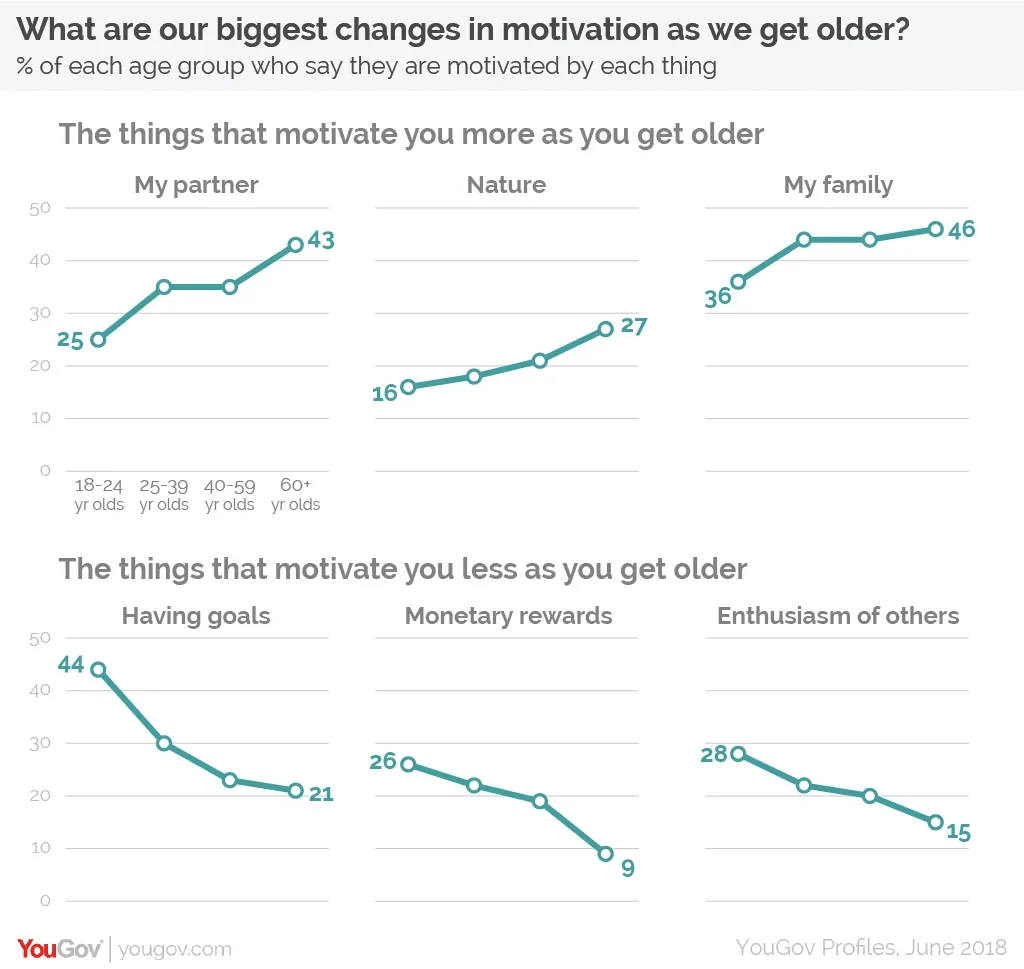YouGov Profiles data reveals what makes people tick across the generations
TWITTER FOLLOW
What gets you out of bed in the morning? What keeps you going when you’re feeling down or uninspired?
YouGov data explores what motivates us most throughout our lives – whether it’s a partner and a bit of nature, or monetary rewards and having goals – and how it changes over time.
Fresh into adult life, you’re likely to be driven by three things: goals, money, and other people.
More than twice the proportion of 18 to 24 year olds as those aged 60 and over are motivated by having goals (44% vs 21%) and money (26% vs 9%). Approaching three in ten (28%) under-25s are driven by other people’s enthusiasm – a higher proportion than any other age group.

But as you get older, you'll be a lot less likely to care what others think of you.
Over time, other people’s enthusiasm doesn’t seem so important to us anymore. Just over one in five (22%) 25 to 39 year olds cite it as a priority, and by the time you reach 60, there's only than a one in six chance (15%) that you'll list it as a motivating factor.
Your keenest socialite side won’t come out until your 60s.
You might think your early 20s are the most socially motivated times of your life – bouncing from party to party, new job to old school reunion, revelling in the freedom of not living at home anymore.
That’s true, to an extent – just over a quarter (27%) of 18 to 24 year olds feel motivated by being social, compared to just a fifth (20%) of 25 to 39 year olds and 40 to 59 year olds (19%).
But it’s in your 60s that you’re likely to place most value on time spent with others. Almost a third (32%) of those aged 60 and above feel motivated by being social, beating youngsters in their enthusiasm for company.
The older you are, the more likely it is that your partner becomes one of your top motivators.
As time goes on, it’s more and more likely that our partners become a motivating factor in our lives. A quarter (25%) among 18 to 24 year olds see them as a motivation in their lives, increasing to over four in ten (43%) of those aged 60 and above. Your family is likely to become an increasingly motivating factor for you too: 36% of 18 to 24 year olds see them as a motivation, rising to 46% of people aged 60 and over.
You’ll feel motivated by taking care of yourself, and then you'll be less likely to care, until you're older and the feeling comes back.
Maybe body image is a big deal to you as a 20-something making your way a sometimes superficial world. Maybe you never quite valued your body so much as when you realised how much harder things can get when it starts getting tired.
Whatever the reason, it’s the youngest and oldest of us who are most likely to be motivated by taking care of ourselves. Over a quarter (26%) of 18 to 24 year olds, and those aged 60+ (29%) see it as a motivating factor, compared to just over a fifth of 25-39 year-olds (22%) and of those aged 40-59 (21%).
As time goes by, you’ll be less excited at the prospect of earning more money.
Just over one in four (26%) 18-24 year olds say a bit of monetary reward goes a long way in motivating them.
But the older we get, the less likely we are to say money motivates us – perhaps because we’re earning more, or perhaps because the money we’ve earned didn’t make us as happy as we thought it would. Under a quarter of 25 to 39 year olds (22%) and just under a fifth of those aged 40 to 59 (19%) are driven by money. This falls to less than a tenth (9%) of people aged 60+.
… and a bit more appreciative of a walk in the park.
If there’s one thing you’re not likely to value as much until you get older, is the motivating power of soaking up some natural light, seeing a beautiful landscape, or just having a stroll around the garden. Only 16% of 18 to 24 year olds feel motivated by nature – but over a quarter (27%) of those above 60 see it as a motivating factor in their day to day lives.











